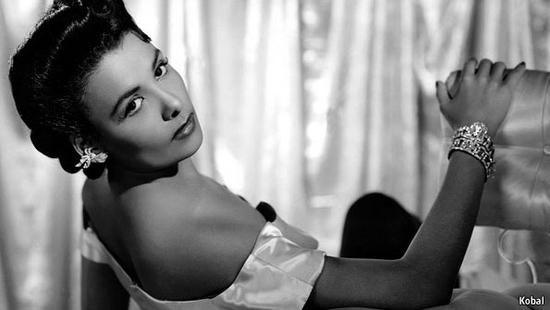A few weeks back, America lost a Hollywood legend but few noticed. Myself included. That was until I read this obituary in The Economist on Lena Horne.
Who is Lena Horne? On a resume it may note some highlights: MGM actress in the 1940s and 1950s, singer, and a list of firsts: first black star on a long-term contract with a studio, first black on the cover of Motion Picture magazine, first star whose picture could be pinned up by black GIs in their lockers.
But Ms. Horne was more than that. She was a pioneer, a pioneer who suffered gross injustice, but in the process she set the precedent for other black actresses to follow. When Hally Berry won her actress she spoke that now the stage is available for other faces of color. But that wasn’t true. The stage was already open and Hally just happened to be the one who won. It is not as if Hally did not win and then next year there was another worthy performance from a black actress that this actress would not have won had Hally did not the previous year. Of course not. She would have won. By the time Hally Berry won Hollywood has already gotten over its ignoble racial past and it was just a question of when there’d be a worthy performance from a black actress. It was then not a question of willingness and opportunity, but of timing. And Hally Berry just happened to have the timing. So she went overboard in portraying herself as a pioneer. She is not a pioneer and only set a technical not a philosophical precedent. Hally Berry grew up in a new industry where race did not matter so much and she – as the Chinese proverb goes – got the shade that the previous generation planted.
It was Lena Horne who had to do the hard work of planting that tree. It was Horne who was the precedent and broke barriers that then allowed the likes of Hally Berry to win Oscars. It was Lena Horne who opened the doors and opportunity to women of color.
Her presence in the industry stood as a mark of America’s racially divisive and prejudiced past:
Her race-blind fans would have been prepared to see her star in any show, as elegant, satin-clad and triumphant as she eventually appeared in 1981 in “The Lady and her Music” in New York. But to casting directors during segregation she could only be a lady’s maid or a jungle girl. At best she could star in all-black comedies, as a devil-sent temptress in “Cabin in the Sky” (1943), or as the lead in the Broadway musical “Jamaica” (1957). She belonged in the piny woods or under the palms.
Because she was lovely, and could sing bewitchingly, she was also allowed a few solo scenes in “white” films. There, like “a butterfly pinned to a column”, she would deliver a number which could be seamlessly cut when the picture was shown in southern cinemas. Her greatest hope was to be allowed to play Julie, a mulatto, in “Show Boat”. But Julie had to fall in love with a white man; so Ava Gardner played her, initially lip-synching to Miss Horne’s recordings and even made browner with her Light Egyptian. Lena and Ava were friends. But it hurt to the end of her days. […]
At one of her lowest points Miss Horne went to tea with Hattie McDaniel, who had played Mammy in “Gone with the Wind”. They ate tiny sandwiches and cakes in her grand drawing room, while Hattie explained that a maid’s role was her only realistic future on the screen. Pretty soon afterwards, she threw in the acting life.
Singing, though she made her career in it, proved no simpler. She toured with Charlie Barnet’s all-white band in 1940, sleeping in the band bus when hotels would not take her in, but counted in her repertoire songs like “Sleepy Time Down South”, which blacks were expected to sing. […]
The insults she suffered, therefore—debarred from lodging houses, spat at in the street, forbidden from mixing with white customers—were all the worse because she did not feel she represented a race, only herself. […]
Miss Horne’s producers once complained that she opened her mouth too wide to sing. They meant it was a Negro thing. Certainly Miss Horne had a wide, extravagant smile, a real show-stopper. But it was on the face of a tiger. It hid a lifetime of ferocious resentment and regret.
Lena suffered through that, but her simple presence created the opening for Hollywood to then respectfully star black actresses.
And she certainly was beautiful, classic beauty:




